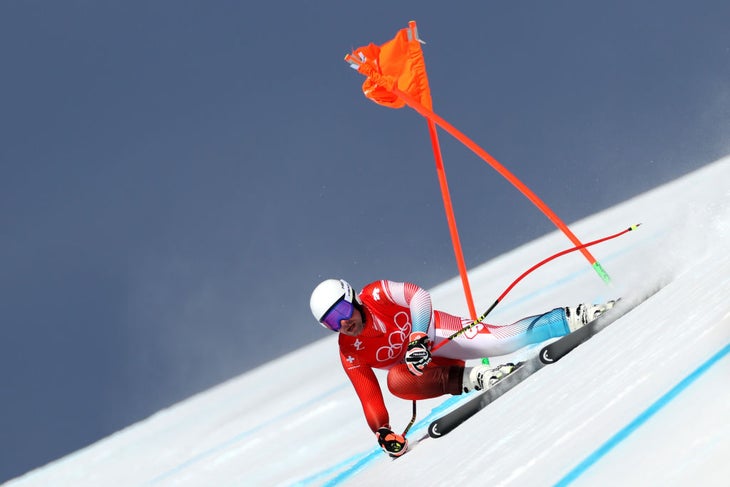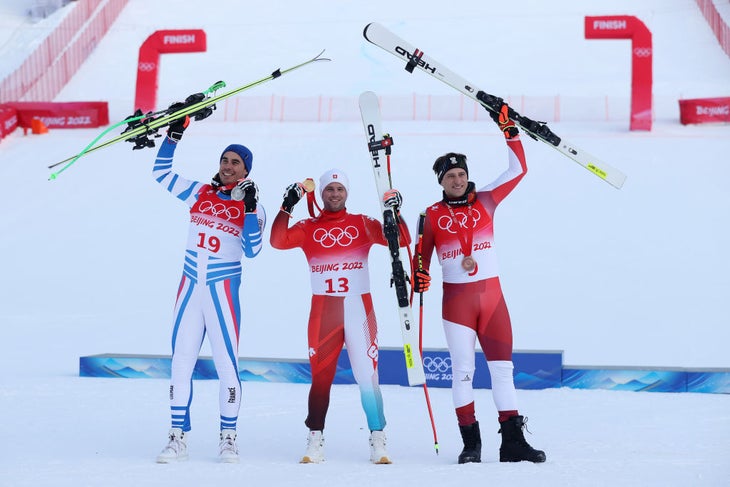Products You May Like
Receive $50 off an eligible $100 purchase at the Outside Shop, where you’ll find gear for all your adventures outdoors.
Sign up for Outside+ today.
There were three things everyone was talking about before Monday’s Olympic men’s downhill: the snow (or lack of it), the wind, and the fact that racers were taking on one of the most dangerous Olympic events with very limited practice.
Switzerland’s Beat Feuz conquered all three on his way to his first Olympic victory on Monday. Skiing with the precision of a fine Swiss watch, Feuz mastered the untested Olympic course and took downhill gold with a time of 1:42.69 seconds. With this victory, Feuz adds a gold to his collection of Olympic hardware—a bronze and silver from the 2018 Games in PyeongChang.
“It means the world to me,” said Feuz, who also celebrated the birth of his second daughter, Luisa, in January. “I can’t think of anything more beautiful than flying home with a gold medal around my neck.”

One of the most dominant male speed skiers over the last five years, and now with Olympic gold, Feuz has cemented himself into the pantheon of downhill greats alongside names like Austrian legend Franz Klammer and Norway’s Aksel Lund Svindal.
Known as “The Rock,” the 2022 Olympic downhill course is made up entirely of man-made snow, thanks to alpine skiing’s Yanqing venue receiving only a few inches of natural snowfall a year. Artificial snow is much more dense and reactive than natural snow and can make dialing in the right equipment setup before race day a serious challenge.
Related: Everything you need to know to be an expert on the speed skiing action in Beijing
To add to the complications, the COVID-19 pandemic forced the cancellation of traditional test events in 2020 and 2021. High winds also plagued the training runs, even canceling the third and final run before also postponing race day by 24 hours. With racers only afforded two training runs and nobody in the field having any prior experience on the course, opportunity was ripe for a surprise podium finish in the men’s Olympic downhill.
Crossing the line a mere 10-hundredths of a second behind Feuz, France’s Johan Clarey claimed silver, making him the oldest alpine skiing Olympic medalist at 41 years old. American great Bode Miller was the previous record holder at 36 years old when he won bronze in the super-G at the 2014 Sochi Games. Clarey has previously flirted with retirement, but a smattering of podium results on the World Cup over the past few seasons has kept him on the circuit. Clarey’s previous Olympic best was 18th in the downhill four years ago.
“I knew I only had one chance left in my career to get a medal in the Olympics,” the Frenchman said. “When you are a medalist, [whether] you are 20 or 41, it doesn’t matter, it’s just an Olympic medal. It’s already a good memory.”
Austrian superstar and two-time Olympic Champion Matthas Mayer finished 0.16 seconds off of Feuz for bronze.

It was a tough day of racing for the Americans, with Vermont’s Ryan Cochran-Siegle leading the way in 14th. Cochran-Siegle was followed by a pair of Californians with Bryce Bennett and Travis Ganong finishing 19th and 20th, respectively.
Bennet was putting together a strong run that could have challenged for a medal before being thrown off his line by the aggressive snow on a key right-hand turn. The 6-foot-7-inch Tahoe native was pushed to a low line and lost crucial time before the final turns. Despite the mistake, Bennett said he had no regrets.
“I wouldn’t change anything,” Bennett said. “I knew I had a good run going. Top to bottom, it was on the limit the entire time. This sport is difficult. For all the pieces to align, especially on an Olympic day—to be honest, I think I had most of them in line. I don’t have words for what happened, it just happened.”
The men continue racing with super-G on Feb. 8. Watch the action unfold live on NBC’s Peacock TV at 10 p.m. EST on Monday, Feb. 7.
